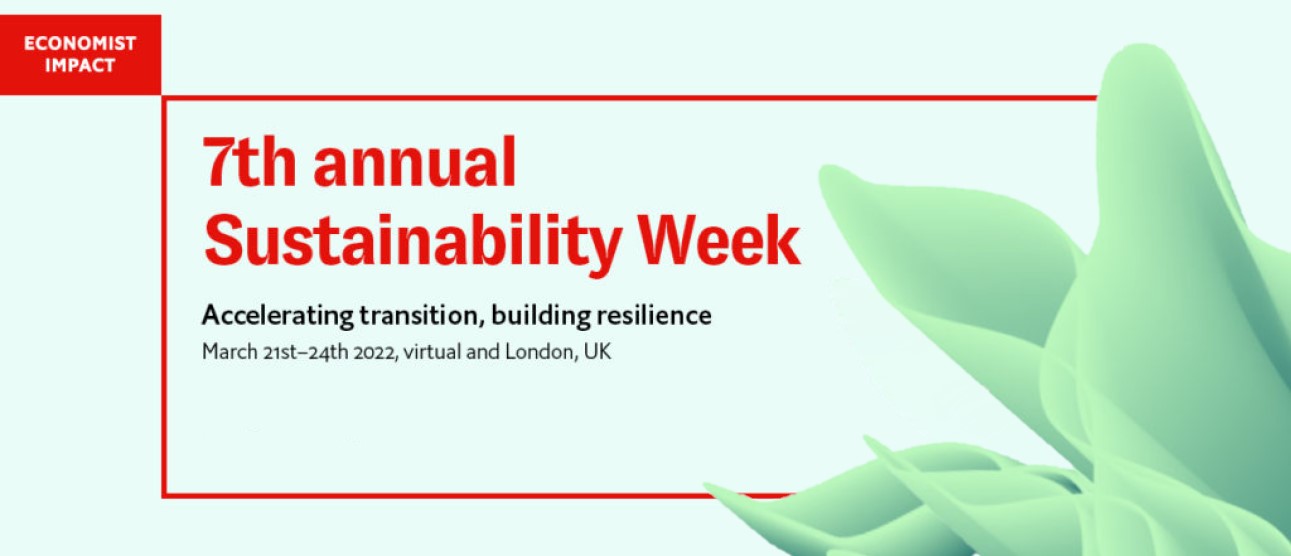NEWS & VIEWS
Four months on from COP26, FSL representatives attended the seventh edition of the Economists Sustainability Week. The event scrutinized how existing policy and regulatory frameworks have addressed climate change, and the progress made so far on emission-reduction commitments. Over the course of the four-day event, industry experts were brought together with policymakers and researchers from across the globe. These individuals gave their assessment on how solutions can be scaled to meet internationally agreed goals so that society can take a more holistic approach to sustainability. Some of the key concepts that were discussed included net zero and energy; climate resilience and adaptation; circular economies; ecosystems and resources; and social sustainability.
The Economist Sustainability Week kicked off with an inspiring line-up of speakers. António Guterres, Secretary General of the United Nations started his keynote remarks with a heartfelt plea to keep the 1.5-degree goal alive, a target he described as being on “life support”. Following on, a panel of experts discussed the next steps following COP26, the consensus was that COP26 created momentum, but it didn’t go far enough. The rest of the day consisted of conversations around ESG data and green finance. The speakers agreed that now is the time to move beyond creating awareness and move towards scaling up through collaboration and technology.
Day two of the Economist Sustainability Week was the in-person event that brought together government ministers, policy researchers and thought leaders in financial services. The day kicked off with keynote remarks by Alok Sharma, President of COP26. He believes that if COP26 was the blueprint for action, then 2022 should be the year to deliver. He also called for further action across critical carbon intensive sectors – such as coals, transportation, and deforestation. Panel hosts and presenters spent the rest of the day talking about inefficiencies in ESG reporting and the importance of ESG data. The experts agreed that regulations are needed so that disclosure is normalised, resulting in data becoming more standardized and ratings more consistent.
Day three of the Economist Sustainability Week brought debates incorporating hydrogen as the future of energy. Researchers answered questions on the viability of hydrogen, as an alternative to fossil fuels and the role of hydrogen in decarbonising our energy system.
The final day of Sustainability Week commenced with keynote remarks by Ban Ki-Moon, former UN General Secretary. He acknowledged that the current geopolitical tensions would have an impact on the delivery of Sustainable Development Goals (SDGs) and climate change. However, as government priorities shift due to current turmoil, climate change may be seen as less important. However, Ban Ki-Moon contends that political will, resources, and global partnerships are key pillars for delivering the SDGs. The UN Global Compact, a framework designed to encourage organisations worldwide, to adopt sustainable and socially responsible policies was another key topic. Sanda Ojiambo, Executive Director, United Nations Global Compact (UNGC) discussed the new ‘Just Transition’ framework. The framework is currently being developed by the trade union movement, it encompasses a range of social interventions needed to secure workers’ rights, as economies shift to sustainable production. Sanda confirmed the UNGC are working together with Just Transition to ensure a collaborative approach.
Overall, the Economist Sustainability Week was an insightful event, and we came away with a greater understanding on the future of sustainability. More information on the presentations and discussions can be found on demand here.

